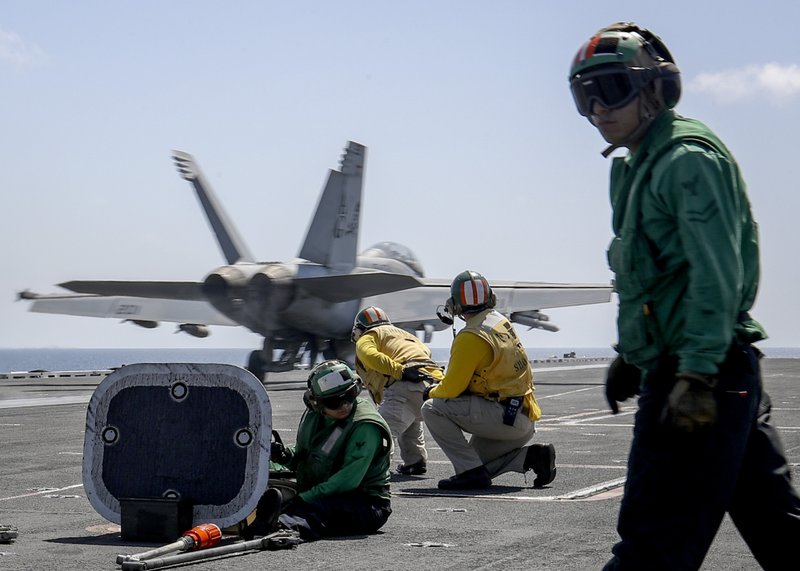TEHRAN, Iran -- Iran's supreme leader publicly chastised the country's moderate president and foreign minister Wednesday, saying he disagreed with the implementation of the 2015 nuclear deal they had negotiated with world powers.
The comments by Ayatollah Ali Khamenei, the first time he's criticized both politicians by name, came as tensions rose with the United States a year after Washington's withdrawal from the accord.
Khamenei has final say on all matters of state, and his assignment of blame limits the influence of President Hassan Rouhani and Foreign Minister Mohammad Javad Zarif -- relative moderates within Iran's Shiite theocracy who had struck the deal.
The White House earlier this month sent an aircraft carrier and B-52 bombers to the region over a still-unexplained threat it perceived from Iran.
Since that development, Iran has announced that it will back away from the atomic accord. The United Arab Emirates, meanwhile, alleged that four oil tankers were sabotaged off its coast, and Iranian-allied rebels in Yemen have staged drone attacks into Saudi Arabia.
Both Washington and Tehran have said they want to ease heightened tensions in the region. But many fear a miscalculation between the two countries, who have a 40-year history of mistrust, could escalate the situation.
Khamenei made the comments before students gathered for a Ramadan lecture. For years, hard-liners have criticized the accord as giving too much away to the West.
Khamenei had given his implicit stamp of approval on the deal. The accord saw Iran limit its enrichment of uranium in exchange for the lifting of crippling economic sanctions.
But the deal has unraveled after President Donald Trump's withdrawal, with the U.S. re-imposing old sanctions and even stricter new ones.
"To some extent, I did not believe in the way that the nuclear deal was implemented," Khamenei said, according to his official website. "Many times I reminded both the president and the foreign minister."
Khamenei has previously warned that the West wasn't trustworthy. But he hadn't named the country's top elected politician and his top diplomat before Wednesday night. He's previously said the two had done the best they could.
Even before Trump became president, there were concerns in Washington that the supreme leader might turn on the agreement if the envisioned sanctions relief fell short of what Tehran expected. For that reason, President Barack Obama's administration dispatched senior officials to Europe, Asia and elsewhere to explain to foreign governments and countries what was permitted.
Former Secretary of State John Kerry and Treasury Secretary Jack Lew each encouraged foreign investors to do business with Iran so the benefits of the deal would be apparent to the Iranian people.
On Monday, Iran announced it had quadrupled its production capacity of low-enriched uranium. Iranian officials made a point to stress that the uranium would be enriched only to the 3.67% limit set under the nuclear deal, making it usable for a power plant but far below what's needed for an atomic weapon.
But by increasing production, Iran soon will exceed the stockpile limitations set by the nuclear accord.
"If we were proceeding at the previous speed, it would have taken several months," said Behrouz Kamalvandi, the spokesman for the Atomic Energy Organization of Iran, in an interview with Tehran's Vatan Emrooz newspaper. "With the changes introduced, we will reach that ceiling in coming weeks."
Tehran has set a July 7 deadline for Europe to set new terms for the deal, or it will enrich closer to weapons-grade levels.
U.S. officials said the Pentagon today will present plans to the White House to send as many as 10,000 more troops to the Middle East to beef up defenses against potential Iranian threats.
The officials said no final decision has been made, and it's not clear whether the White House would approve sending all or just some of the requested forces. Officials said the move is not in response to any new threat from Iran but is aimed at reinforcing security in the region. They said the troops would be defensive forces and that the discussions include additional Patriot missile batteries, more ships and increased efforts to monitor Iran.
The officials spoke on condition of anonymity because the plans have not been formally announced.
Air Force Col. Patrick Ryder, spokesman for the Joint Chiefs of Staff, declined to comment, saying, "As a matter of long-standing policy, we are not going to discuss or speculate on potential or alleged future operations or plans."
Information for this article was contributed by Nasser Karimi, Matthew Lee, Lolita C. Baldor and Robert Burns of The Associated Press; and by Ladane Nasseri of Bloomberg News.
A Section on 05/23/2019
